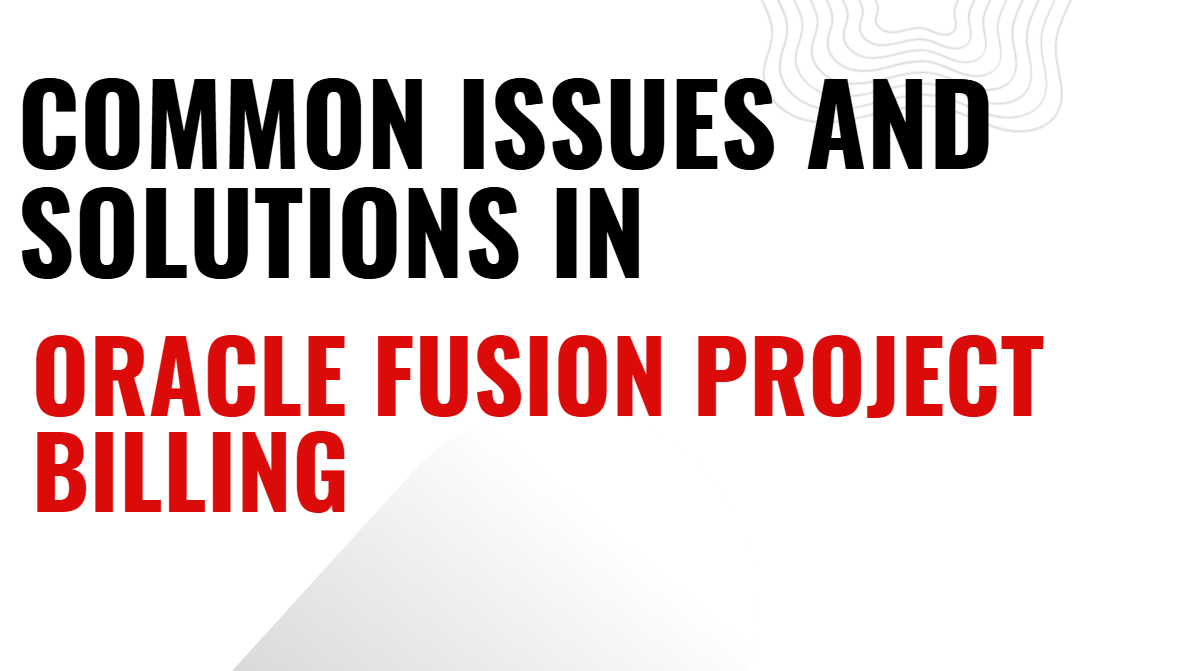When transitioning from Oracle E-Business Suite (EBS) R12 to Oracle Fusion Cloud Projects, many organizations discover key differences in how billing, revenue recognition, and integration with Receivables and Payables are handled.
This blog highlights some of the most frequently encountered issues in Oracle Fusion Project Billing and provides practical solutions based on Oracle best practices and support references.
Check here training videos for project execution management in Oracle fusion
1. Review and Release of Revenue Lines
Issue:
In EBS R12, users can manually review, release, or delete revenue lines before finalizing them. This allows correction of incorrect revenue lines.
Fusion Difference:
Oracle Fusion does not include the review/release step. Revenue recognition is fully automated and controlled by contract setup, revenue methods, and performance obligations.
Solution:
Use configuration controls—such as revenue method classifications and contract performance obligations—to manage when and how revenue is recognized.
Refer to Oracle’s document “Fusion Approach to Revenue Processing” for guidance on configuring revenue rules effectively.
2. Unapplying and Reapplying Negative Invoices (Credit Memos)-Common Issues in Project blling
Issue:
Need the ability to unapply a negative invoice generated from a project contract and reapply it to a different invoice.
Solution:
In Fusion, credit memos cannot be unapplied, as they are directly linked to their original invoice in Receivables.
To re apply:
- Unapply the Receivables payment instead.
- Then apply the credit memo to the correct original invoice in Receivables.
When adjustments (such as cancellations or write-offs) occur, Fusion automatically creates invoice distribution reversals. These are tracked in the PJB_INV_LINE_DISTS table, referencing the original distribution lines.
3. Transfer to Receivables Error: “Transaction Type Creation Sign Is Invalid”
Issue:
When transferring invoices to Receivables, the following error appears: “Must set the creation sign for the Oracle Fusion Receivables transaction type to Any Sign.”
Cause:
The Contract setup uses a transaction type with Creation Sign = Positive. Fusion Project Billing invoices can include both positive and negative amounts.
Solution:
Set the Creation Sign to Any for the transaction type:
- Navigate to: Setup and Maintenance → Manage Transaction Types
- Update the creation sign.
4. Cannot Generate Revenue More Than Once (Rate-Based Methods)-Common Issues in Project blling
Issue:
Revenue is expected but not generated for certain rate-based transactions.
Solution:
- Review Billing Transaction Exceptions for logged issues.
- Check the Ineligible Expenditure Items section of the Generate Revenue report.
- Verify the currency conversion setup on the contract:
- Ensure a valid Daily Rate exists for the selected rate type.
- Avoid using the “User” conversion rate type unless you manually supply a rate.
Common Error: PJB_CURR_NO_EXCH_RATE_CONTRACT
Note: Oracle plans to deliver a feature allowing contract-specific conversion rate overrides within 12 months.
5. Billing Transaction Exception – “No Active Nonlabor Bill Rate or Markup Percentage”
Issue: “This transaction does not have an active nonlabor bill rate or markup percentage.”
Solution:
If the invoice method is Cost Reimbursable, the markup should not be “0”.
Leave the markup field blank (null) and reprocess the transaction.
6. AR AutoInvoice Fails – “Invalid Unit of Measure (UOM_CODE)”
Issue:
AutoInvoice process fails with error: “The Unit of Measure Code {UOM_CODE} is invalid (EA).”
Solution:
Check the following profile option:
Navigation:
- Go to Setup and Maintenance → Manage Administrator Profile Values
- Search for Profile Option Code: PJB_AR_INVOICE_UOM
- Validate that a correct UOM value (e.g., EA, HOUR) is defined under Profile Values.
7. Markup Column Not Available for Job Rate Schedule
Issue:
Markup percentage not available in Job Rate Schedule for billing.
Solution:
Fusion currently does not support markups at the Job Rate Schedule level.
Alternative configurations:
- Apply markup via Invoice Method (Cost Reimbursable)
- Use Bill Plan overrides (person/job billing rates or labor multipliers)
- Implement Burden Schedules for complex markup logic
8. Assigning Payables Document Sequences to Project Invoices
Issue:
Need to assign specific Payables document sequences to invoices created from Projects.
Solution:
Currently, Project Billing does not pass document sequence categories to Payables when transferring intercompany or interproject invoices.
Oracle has logged an Enhancement Request (ER Bug 24821166) to introduce this functionality in a future release.
Check here frequently asked questions for project billing
Summary
While Oracle Fusion Project Billing automates many revenue and billing processes, it also removes certain manual controls that existed in EBS. Understanding these key differences and adjusting your configuration accordingly ensures smoother invoice generation, accurate revenue recognition, and better control over downstream Receivables and Payables processes.
Key Takeaways
- Fusion automates revenue recognition; there’s no manual review/release.
- Credit memos are system-controlled and cannot be manually unapplied.
- Always set Receivables transaction types to Creation Sign = Any.
- Validate conversion rates and markup configurations for rate-based contracts.
- Some legacy setups (like job rate markups or document sequencing) are pending future enhancement.

